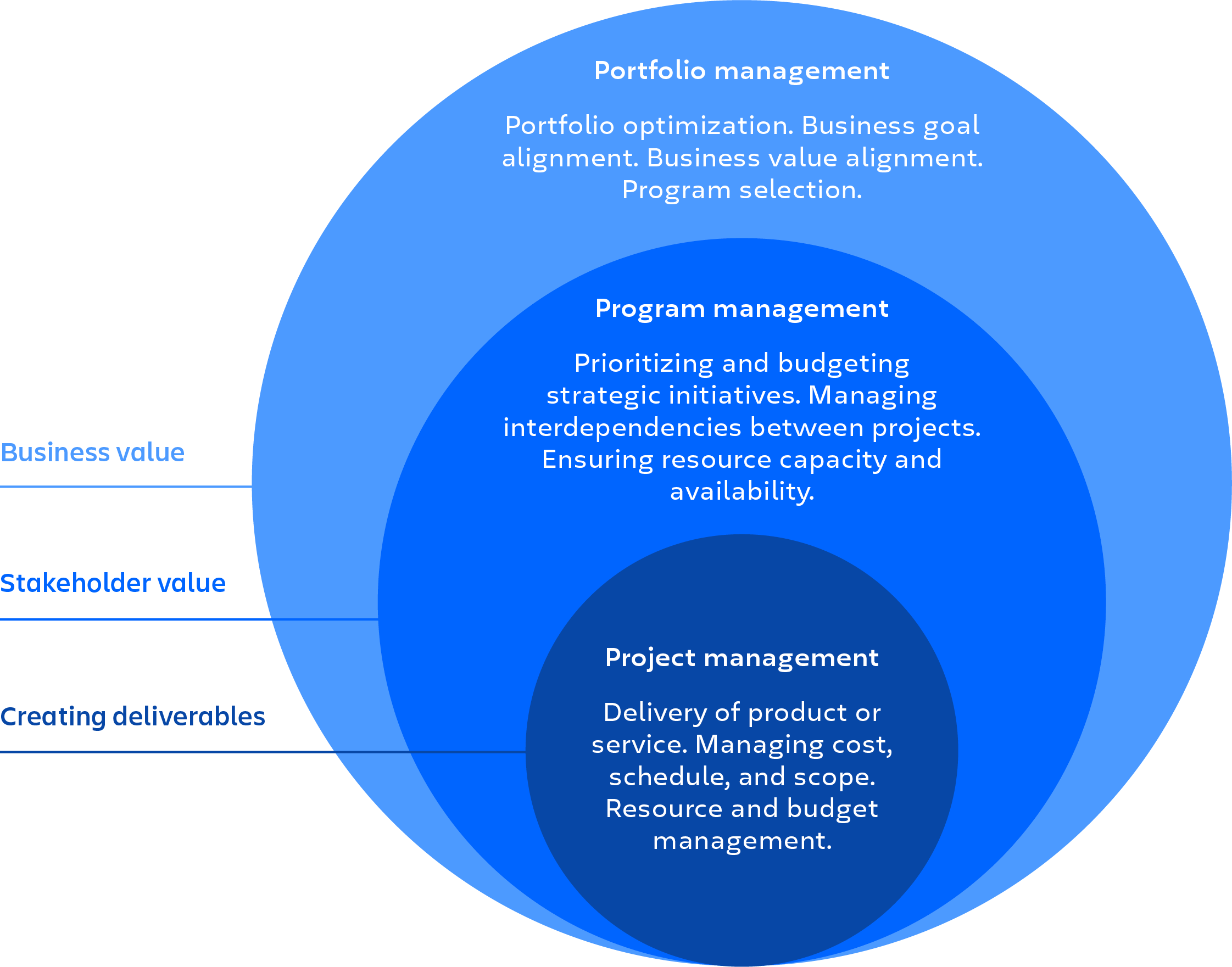Program manager and project manager roles may sound similar, but they are two distinct positions in Agile methodology. Program managers ensure the work of Agile teams aligns with the company’s long-term strategy. They consider the big picture, supporting an overall company initiative. Project managers are frontline workers who lead a team through deadlines and deliverables. They focus on the day-to-day activities that contribute to these larger objectives.
This article outlines the difference between program manager vs. project manager roles, including their responsibilities and functions in a company.
The role of a program manager
Program managers are responsible for a group of projects, which are collectively known as a program. The role is similar to that of a product manager who is in charge of identifying customer and business needs. Project managers work with program managers to develop a project plan for their team. They coordinate with the C-suite on the company’s goals and business objectives and act as strategic advisors, formulating new tactics. They ensure alignment between strategic objectives, the program, and individual teams.
A program manager oversees program execution, ensuring cross-collaboration between projects and teams. Their ability to effectively run a program indicates their success within the company.
Program managers formulate and organize inter-connected projects. They must decide what strategies and objectives to pursue and coordinate with the various project teams. They may even have a leadership role where they must oversee and evaluate project managers’ performance.
All deadlines and budgets must go through the program manager because they are responsible for risk and resource management.
The role of a project manager
A project manager oversees a team that performs activities relating to a project in the program. They own a project and are responsible for its execution from start to finish.
Project management involves overseeing and leading short-term projects with a definitive timeline and end date. For example, project managers create the cross-functional workflow for a project and team. They focus on daily operations, such as priorities, tasks, milestones, and deliverables.
Project managers focus on meeting deadlines and are less involved in the overall organizational picture. For instance, they get involved in small-scale projects, such as implementing a new feature request. They set the project scope and allocate resources to meet project goals. Or, they may be a Scrum master if the company uses the Scrum framework.
Program managers vs. project managers: key differences
Program and project managers help companies achieve their objectives in different ways. The diagram below illustrates the main differences and similarities between the roles of program vs. project managers:

This graphic shows the breakdown of project and program management and how they overlap.
Responsibilities
Program manager vs. project manager responsibilities differ in many ways. Project managers oversee small projects that incrementally contribute to a program. They manage resources, deliverables, and deadlines.
A program manager, however, establishes programs and their objectives based on a company’s business needs. They are important strategic advisors collaborating with stakeholders and the C-suite and coordinating with project managers. They work to create roadmaps, budgets, and schedules. But one thing they must do is mitigate risk. For instance, they determine whether a program will be too costly to pursue and potentially become a money pit. Ultimately, they monitor and measure the effectiveness of a program.
Skills
Project manager and program manager skills tend to overlap. They both need to be clear communicators, process-oriented, tactical and strategic thinkers, and familiar with Agile methodologies. They must also be metrics-oriented and able to analyze data and adjust projects and timelines based on the analysis results.
In addition to these skills they share, a program manager needs to be able to think more broadly than a project manager. They must focus on the macro-level aspects of several projects and decisions, as well as how interrelated projects contribute to company goals.
Goals
The goals of a project manager and program manager also differ. A program manager’s goals are more strategic and seek to align program objectives with the company’s mission. They focus on how program objectives provide value to the company and its stakeholders.
Project managers consider the day-to-day details of a project to ensure the team meets the project objectives. They concentrate on milestones, deliverables, and resource management to efficiently run projects that deliver value to customers. Project managers focus on meeting deadlines, while program managers are responsible for how each project contributes to the wider organizational picture.
Tools required
Both professionals must be proficient in project and program management software to accurately allocate resources, track progress, and measure success. They must also be familiar with content management systems and using tools such as a RACI chart, which delineates roles among team members on a given project.
One useful tool in their toolbox is user stories, which allows program managers to center business objectives with user needs.
Because program managers have a broader focus than project managers, they should also be familiar with work management solutions to seamlessly manage multiple projects.
How do program managers and project managers collaborate?
Program managers and project managers should be close collaborators. They rely on each other to accomplish program goals and objectives.
In a traditional hierarchy, a project manager reports to a program manager. That’s because a project manager is working on one piece of the program, which the program manager is primarily responsible for. However, in more flat structures, they work as partners to figure out how best to break a program down into smaller, inter-connected projects.
Is a program or project manager best for your team?
Both roles benefit a company, as an effective project manager will execute projects that align with your company’s objectives and a program manager will determine what those objectives are and how they should be carried out in an inter-connected project.
Determining whether you need a program manager vs. project manager depends on your company’s needs. Do you need someone strategic to align the company’s work with its mission or someone to ensure your teams meet their deliverables and deadlines?
If you need someone strategic who can juggle multiple projects, choose a program manager. But if you need someone to drive a single project, a project manager is a better choice. However, you may find that you’ll need both to accomplish an entire program’s group of tasks.
Achieve success with the right role
Program managers and project managers are vital to the success of any company. You’ll need one or the other to ensure you can improve your product and services. However, program managers and project managers need the right tools to help them succeed.
Atlassian’s Jira Align is a program management software that can help track programs in one easy dashboard with real-time visibility. It enables program managers to allocate resources appropriately and run programs smoothly. It also allows them to coordinate with project managers and communicate outcomes to stakeholders.
Jira Software is a great tool for project managers to plan and track project progress. It also allows them to align with other teams, such as business, sales, marketing, and HR. While Jira Software is purpose-built for software project management, Jira Work Management is specifically built for business teams.
With Jira Work Management, you can better plan your team’s workload and understand potential roadblocks, and it works seamlessly with Jira Software and Jira Align.
Program manager vs. project manager: frequently asked questions
Can program managers become project managers?
Yes, many program managers start as project managers. However, to progress to the new role, a project manager must be willing to learn new skills and undertake additional job training, including certification programs.
As a project manager, you’ll want to get more involved in large-scale projects. That way, you gain the tools to lead multiple projects at once.
Are program managers considered more senior than project managers?
The seniority of these roles depends entirely on the company’s hierarchical structure. In a more traditional hierarchy, a project manager often reports to a program manager who, in turn, reports to the C-Suite, VPs, or the company president. However, in flatter hierarchies, program and project managers are close partners, collaborating to meet company objectives.
